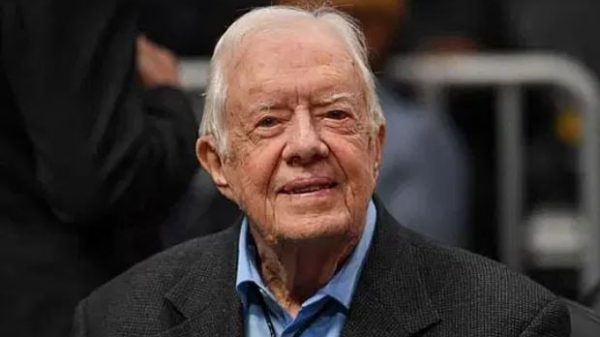

Tributes poured in Monday for Jimmy Carter, the former US president and Nobel peace laureate who rose from humble beginnings in rural Georgia to lead the nation and died aged 100.
Carter had been in hospice care since mid-February 2023 at his home in Plains, Georgia — the same small town where he was born and once ran a peanut farm before becoming governor and running for the White House.
Carter died “peacefully” at his home in Plains, “surrounded by his family,” the Carter Center said in a statement on Sunday.
“My father was a hero, not only to me but to everyone who believes in peace, human rights and unselfish love,” Chip Carter said in the statement.
Outside the White House, where the flag was lowered to half-staff, visitor Yoni Neirman remembered Carter, for whom she voted, as “a real statesman, and that kind of person doesn’t seem to exist, at least not in the near future.”
In Georgia, retiree Dorner Carmichael expressed the same sentiment.
“Every time you lose a person of such integrity, who spent his life in service, you just wonder who will fill his shoes,” the 75-year-old told AFP.
Carter was the longest-lived US president — an outcome that seemed unlikely when the Southern Democrat revealed in 2015 that he had brain cancer.
But the US Navy veteran and fervent Christian repeatedly defied the odds to enjoy a long and fruitful post-presidency, after four years in the Oval Office often seen as disappointing.
During his single term, Carter emphasized human rights and social justice, enjoying a strong first two years that included brokering a peace deal between Israel and Egypt dubbed the Camp David Accords.
But his administration hit numerous snags — the most serious being the taking of US hostages in Iran and the disastrous failed attempt to rescue the 52 captive Americans in 1980. He also came in for criticism for his handling of an oil crisis.
Republican challenger Ronald Reagan clobbered Carter at the polls in November of that year. Reagan, a former actor and governor of California, swept into office on a wave of staunch conservatism.
– Active post-presidency –
As the years passed, a more nuanced image of Carter emerged — one that took into account his significant post-presidential activities.
He founded the Carter Center in 1982 to pursue his vision of world diplomacy, and he was the recipient of the 2002 Nobel Peace Prize for his efforts to promote social and economic justice.
He observed numerous elections around the world and emerged as a prominent international mediator, tackling global problems from North Korea to Bosnia.
He and his wife Rosalynn also helped build houses for the charity Habitat for Humanity for decades.
Carter, known for his toothy smile, said basic Christian tenets such as justice and love served as the bedrock of his presidency. He taught Sunday school at Maranatha Baptist, his church in Plains, well into his 90s.
– Leader, statesman and humanitarian –
As condolences came in, many focused on Carter’s character, with President Joe Biden, in televised remarks, saying he “lived a life measured not by words, but by his deeds.”
“The rest of the world looks to us… and he was worth looking to.”
Biden declared January 9 a national day of mourning, calling on Americans to “pay homage” and inviting “the people of the world who share our grief to join us in this solemn observance.”
White House leaders past and future joined the president in issuing remembrances, with Bill Clinton saying that Carter “worked tirelessly for a better, fairer world.”
George W. Bush said Carter’s legacy would “inspire Americans for generations,” while Barack Obama said the former leader “taught all of us what it means to live a life of grace, dignity, justice, and service.”
Donald Trump said Americans owed the Democrat “a debt of gratitude,” adding later: “I strongly disagreed with him philosophically and politically.”
One of Carter’s defining foreign policy achievements — negotiating the return of the Panama Canal to Panama — has come back into focus as Trump has threatened to retake the channel.
Egyptian leader Abdel Fattah al-Sisi also hailed Carter as “a symbol of humanitarian efforts” for his role in brokering the 1978 Camp David Accords, predicting his work would “remain etched in the annals of history.”
Israel’s President Isaac Herzog said the peace treaty Carter forged “remains an anchor of stability throughout the Middle East and North Africa many decades later.”
In China, where Carter’s administration normalized diplomatic ties with Beijing in 1978, leader Xi Jinping said he was “deeply saddened”.
Carter “had long made significant contributions to advancing the development of China-US ties and fostering friendly exchanges and cooperation between the two countries”, state broadcaster CCTV reported Xi as saying.
Carter was preceded in death by Rosalynn, to whom he was married for 77 years. She died on November 19, 2023, at age 96.
The former president poignantly appeared at her memorial service in a wheelchair, with a blanket on his lap bearing their likenesses.
Carter is survived by the couple’s four children — three sons and one daughter.
Leave a Reply